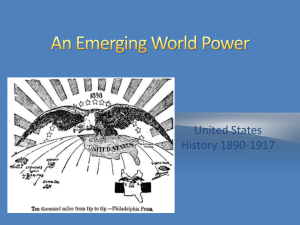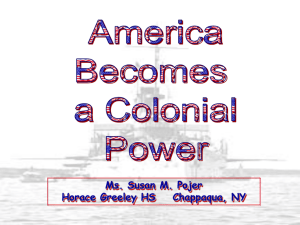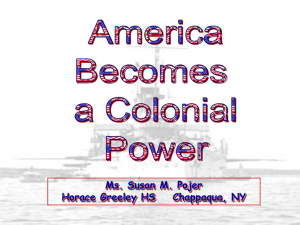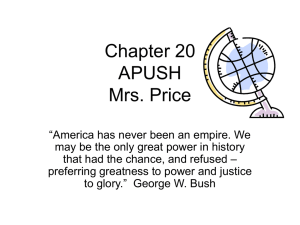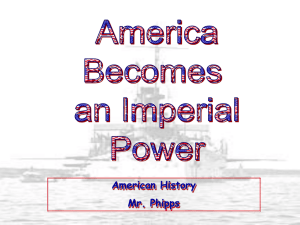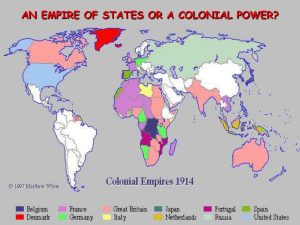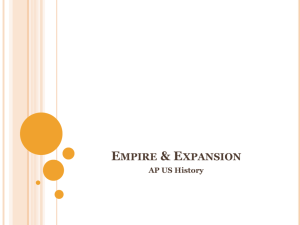American Imperialism
advertisement
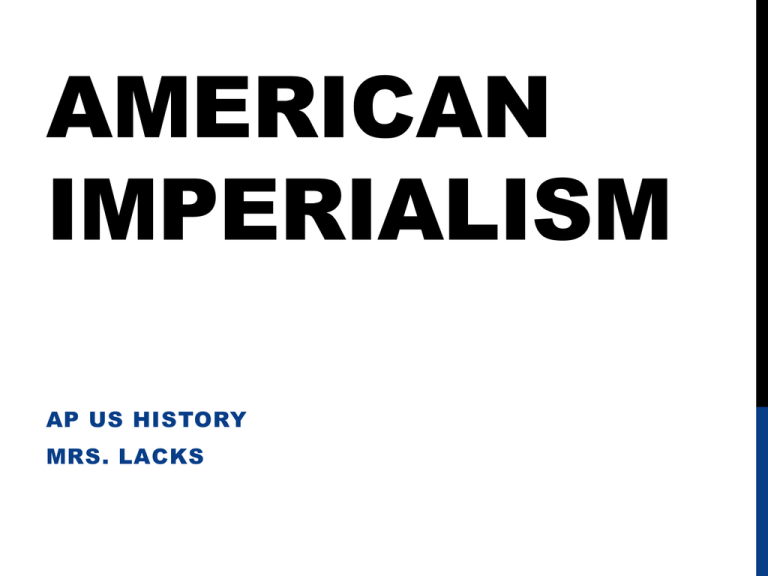
AMERICAN IMPERIALISM AP US HISTORY MRS. LACKS ESSENTIAL QUESTION Why did America join the Imperialist club at the end of the 19th century? • • • • • Commercial/Business Interests ($) Military/Strategic Interests Social Darwinist Thinking Religious/Missionary Interests Closed the US frontier US FRONTIER, CLOSED BY 1890 COMMERCIAL/ BUSINESS INTERESTS US Foreign Investments (1869 – 1908) COMMERCIAL/ BUSINESS INTERESTS MILITARY/STRATEGIC INTERESTS Alfred T Mahan wrote The Influence of Sea History: 1660 1783 SOCIAL DARWINIST THINKING GREAT BRITAIN, MODEL OF IMPERIALIST THINKING GREAT BRITAIN, MODEL OF IMPERIALIST THINKING RELIGIOUS/MISSIONARY INTERESTS US missionaries in China, 1905 1st Church in Hawaii, 1820s HAWAII: CROSSROADS OF THE PACIFIC US VIEW OF HAWAIIANS Hawaii becomes a US Protectorate in 1849 by virtue of economic treaties. QUEEN LILIUOKALANI US BUSINESS INTERESTS IN HAWAII 1875 – Reciprocity Treaty (free trade) 1890 – McKinley Tariff (protectionism) 1893 – American businessmen backed an uprising against Queen Liliuokalani. Sanford Ballard Dole • proclaims the Republic of Hawaii in 1894 (w himself as President) • 1st governor of territorial Hawaii (1900 – 1903) HAWAIIAN ANNEXATION CEREMONY, 1898 FROM THE MONROE DOCTRINE TO THE LODGE COROLLARY (1912) Senator Henry Cabot Lodge, Sr. (R-MA) Non-European powers, like Japan, would be excluded from owning territory in the Western Hemisphere. THE IMPERIALIST TAILOR CUBA SPANISH MISRULE IN CUBA VALERIANO WEYLER’S “RECONCENTRATION” POLICY “YELLOW JOURNALISM” & JINGOISM Hearst to Frederick Remington: “You furnish the pictures, and I’ll furnish the war!” Joseph Pulitzer William Randolph Hearst DE LÔME LETTER Dupuy de Lôme, Spanish Ambassador to the U.S. Criticized President McKinley as weak and a bidder for the admiration of the crowd Said he was a would-be politician who tries to leave a door open behind himself while keeping on good terms with the jingoes of his party THEODORE ROOSEVELT Assistant Secretary of the Navy Imperialist and American nationalist Criticized President McKinley as having the backbone of a chocolate éclair Resigns his position to fight in Cuba. REMEMBER THE MAINE AND TO HELL WITH SPAIN! Funeral for Maine victims in Havana THE SPANISH-AMERICAN WAR (1898): “THAT SPLENDID LITTLE WAR” US vs. Spain Pacific Theatre (May – August 1898) Caribbean Theatre (Feb 1898; June & July 1898) THE PACIFIC THEATRE: THE PHILIPPINES & GUAM DEWEY CAPTURES MANILA WILLIAM H TAFT, 1ST GOVERNOR-GENERAL OF THE PHILIPPINES THE CARIBBEAN THEATRE: CUBA The “Rough Riders” OUR SPHERE OF INFLUENCE TREATY OF PARIS, 1898 Cuba was freed from Spanish rule. Spain gave up Puerto Rico and the island of Guam. The U. S. paid Spain $20 mil. for the Philippines. The U. S. becomes an imperial power! THE AMERICAN ANTIIMPERIALIST LEAGUE Founded in 1899. Mark Twain, Andrew Carnegie, and William Jennings Bryan among the leaders. Campaigned against the annexation of the Philippines and other acts of imperialism CUBAN INDEPENDENCE? Teller Amendment (1898) • US could not annex Cuba, but military could be there Platt Amendment (1903) • • • • Senator Orville Platt Cuba was not to enter into any agreements with foreign powers that would endanger its independence. The U.S. could intervene in Cuban affairs if necessary to maintain an efficient, independent govt. Cuba must lease Guantanamo Bay to the U.S. for naval and coaling station. Cuba must not build up an excessive public debt. DILEMMA… DID US CITIZENSHIP FOLLOW THE FLAG? PUERTO RICO 1900 - Foraker Act. • PR became an “unincorporated territory.” • Citizens of PR, not of the US. • Import duties on PR goods 1901-1903 the Insular Cases. • Constitutional rights were not automatically extended to territorial possessions. • Congress had the power to decide these rights. • Import duties laid down by the Foraker Act were legal! PUERTO RICO 1917 – Jones Act • Gave full territorial status to PR. • Removed tariff duties on PR goods coming into the US. • PRs elected their own legislators & governor to enforce local laws. • PRs could NOT vote in US presidential elections. • A resident commissioner was sent to Washington to vote for PR in the House. PUERTO RICO Today Jones Act still in effect However, in 1992, President George H. W. Bush.. • Est. that all federal departments, agencies, and officials should treat Puerto Rico administratively as if it were a state • now, many including the FBI, FEMA, TSA, Social Security, and others have presence there • Also has a federal district court, and PR judges have served in that Court and in other federal courts on the mainland regardless of their residency status at the time of their appointment PANAMA SAVE 9,000 MILES! PANAMA CANAL TR, THE IMPERIALIST 1903 TRAVEL THE PANAMA CANAL… http://www.youtube.com/watch?feature=iv&v=fApnN54uPw&annotation_id=annotation_655031 THE ROOSEVELT COROLLARY TO THE MONROE DOCTRINE: 1905 “Chronic wrongdoing… may in America, as elsewhere, ultimately require intervention by some civilized nation, and in the Western Hemisphere the adherence of the United States to the Monroe Doctrine may force the United States, however reluctantly, in flagrant cases of such wrongdoing or impotence, to the exercise of “an international police power” SPEAK SOFTLY, AND CARRY A BIG STICK FAR EAST IMPERIALISM CHINA Open Door Policy (1898) Secretary of State John Hay Give all nations equal access to trade in China. Guaranteed that China would NOT be taken over by any one foreign power. JAPAN Commodore Matthew Perry opens up Japan, 1853 The Japanese View of Commodore Perry TREATY OF KANAGAWA, 1854 200 years of Japanese isolationism ends GENTLEMEN’S AGREEMENT A Japanese note agreeing to deny passports to laborers entering the U.S. Japan recognized the U.S. right to exclude Japanese immigrants holding passports issued by other countries. The U.S. government got the school board of San Francisco to rescind their order to segregate Asians in separate schools. Why? Nativism in San Francisco ROOT-TAKAHIRA AGREEMENT: 1908 Japan and US • A pledge to maintain the status quo in the Far East. • Recognition of China’s independence and territorial integrity, and support for continuation of the Open-Door Policy • Maintenance of free trade and equal commercial opportunities • Japan recognizes US control of Hawaii and the Philippines • US recognizes Japanese ability to annex Korea US concerns? • Japanese naval capabilities (post Russo-Japanese War) • Japanese economic interest in Manchuria AMERICA’S NEW ROLE? THE CARE OF A GROWING FAMILY CONSTABLE OF THE WORLD NAVAL SUPERPOWER: GREAT WHITE FLEET (1907) TREATY OF PORTSMOUTH: 1905 Nobel Prize for Teddy ADDITIONAL INFO TAFT’S DOLLAR DIPLOMACY Improve financial opportunities for American businesses. Use private capital to further U. S. interests overseas. Therefore, the U.S. should create stability and order abroad that would best promote America’s commercial interests. MEXICAN REVOLUTION 1910S Victoriano Huerta seizes control of Mexico and puts Madero in prison where he was murdered. Emiliano Zapata Porfirio Diaz Venustiano Carranza, Pancho Villa, Emiliano Zapata, and Alvaro Obregon fought against Huerta. The U.S. also got involved by occupying Veracruz and Huerta fled the country. Eventually Carranza would gain power in Mexico. Francisco Madero Pancho Villa Venustiano Carranza WILSON’S MORAL DIPLOMACY The U. S. should be the conscience of the world. Spread democracy. Promote peace. Condemn colonialism. SEARCHING FOR BANDITOS General John Pershing & Pancho Villa In 1914 US GLOBAL INVESTMENTS IN LATIN AMERICA, 1914 US INTERVENTIONS IN LATIN AMERICA, 1898 - 1934 UNCLE SAM: ONE OF THE BOYS?
